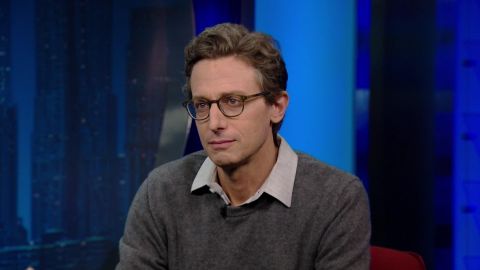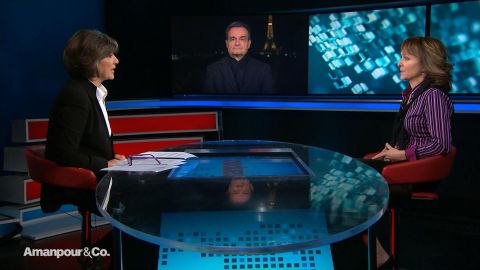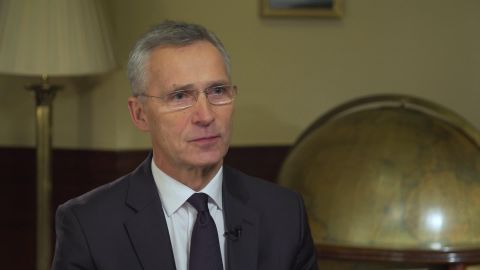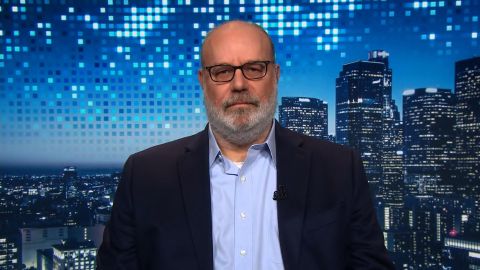Read Transcript EXPAND
CHRISTIANE AMANPOUR: Jonah Peretti is the co-founder of The Huffington Post and CEO of BuzzFeed, some of the most used online platforms for news and entertainment. And he says our media ecosystem is broken. He spoke to our Walter Isaacson about what public interest means in this Internet age.
(BEGIN VIDEOTAPE)
WALTER ISAACSON: You did The Huffington Post, then BuzzFeed. And you were there for this sort of glory — glorious feeling that media was going to bring us together. Do you think that’s fallen apart now, that the media is dividing us?
JONAH PERETTI, CEO, BUZZFEED: I think there was tremendous optimism about the Internet. People were very excited about it empowering people to have a voice and everyone have a voice. And I think we are in a different stage of the Internet right now. There’s a lot more fear. There’s a lot more focus on the negative sides of the Internet and the downsides of the Internet. But I’m still very optimistic about the Internet and think that the First Amendment, free expression, the ability to create on new platforms, you have the ability to make things that have a global impact, are all really exciting. We just need to continually improve and reinvent the Internet in order to have it live up to its promise.
ISAACSON: Well, let’s talk about some of the fixes that could have it live up to the promise. And we will start with BuzzFeed. What does each news group or news service, what should they be doing to help restore the good part of the Internet?
PERETTI: So, I think, a few years ago, we were swimming with the tide, making content that was joyful and truthful. We would make fun, entertaining content people would share with their friends. We would break stories and expose things that powerful people didn’t want exposed with our news division. And that felt like it was in line with the way people saw the Internet in those years. I think, more recently, people have started to see the Internet in a more negative light. I think the kinds of content spreading on the Internet has not been defined by joy and truth. They have been defined more by fear and lies, hate and lies. Negative emotion is driving a lot of the sharing. If you look at the most shared things on Facebook, they tend to fear — right now, it tends to be fear-based content. You look a few years ago, it tends to be joyful content. And so I think there’s been a big shift. The biggest thing BuzzFeed has done is to stay true to that joy and truth. So, even in the era where we know, if we just look at the data, that scaring people will drive lots of sharing and engagement, we still are focused on joy and truth. And I think that’s the key thing that the Internet can really provide for the audience.
ISAACSON: You and BuzzFeed work very closely with Facebook. What would you want them to do to improve things?
PERETTI: I think the biggest thing — and they’re starting to do it — is recognizing the difference between news and other types of content. If you have low-quality entertainment content, it’s just low-quality entertainment content. If you have low-quality news, it stops being news. It starts to be fake news or some counterfeit news. If you’re not calling people up, if you’re not checking sources, if you’re not working on getting an accurate story, then it isn’t really even news. And so I think Facebook has started to realize that, that creating this new news tab, paying some companies to produce high-quality journalism, recognizing that, in an open marketplace of content, where every piece of content is competing with every other, there’s no way that journalism will be able to win, because it’s more expensive to produce. Yet you need quality journalism on a platform that two billion people are accessing.
ISAACSON: It seems to me — and push back if you think I’m wrong — that one of the formulas of BuzzFeed is a mix of sort of what you almost would call clickbait, wonderful, fun little things that are going to grab people, and then journal — you have Ben Smith, you have others who do high-quality journalism. And, sometimes, you use one to drive traffic or cross-subsidize the other. Is that the way you look at it? And is that sustainable?
PERETTI: It’s not really how I look at it. I love the entertainment content we make. We make lists, we make quizzes. I think it just has to be looked at through a really different lens. It is tied to emotion. It is tied to social connection. We have a lot of young people who, in groups, will take BuzzFeed quizzes, compare their results with each other, use it as a way to connect with people in their lives. A lot of entertainment content exposes people to new things in the world, new identities, new groups, new ideas, new ways of living. Increasingly, people have access to an overwhelming number of possibilities. There’s overwhelming choice. And a lot of our entertainment content is people trying things, experiencing things. What kind of show should they watch? What kind of place should they visit? What kind of food should they cook? What kinds of things should they eat? And that has become increasingly a way of curating these massive platforms, and allowing our audience to see what’s worth their time, what’s worth doing, what kinds of fun things should they do with their friends. And so, really, how to how to connect and do interesting things in the world and how to connect with their friends and other people is a huge part of the BuzzFeed entertainment brand and what we do with Tasty, what we do with BuzzFeed, and the news pieces,where it’s much more informational. There’s less than an emotional component and a social component. And it’s more about exposing things that the public has a right to know.
ISAACSON: BuzzFeed recently had to do some layoffs. Was there — what were the reasons behind the stutter step in the business model?
PERETTI: Yes, I mean, BuzzFeed has started with a business model of native advertising that was 100 percent of our revenue. And we had to transition our business to have four or five different sources of revenue. And it was a pretty dramatic transformation. We have grown our revenue 10 years in a row since we have had any revenue. We have been able to continue to grow it. But some lines of revenue have declined, and then others have emerged to make up for those declines and help us continue to grow. And so, without much change and shift in our business, we have had to make some unfortunate restructuring and changes to be able to set ourselves up for the future. This year, we have crossed over into profitability. We should be profitable for all of next year. We are feeling very strong. We’re feeling great about our business right now. But we got to this place because we had to make a lot of really — we had to really actively manage the business and make a lot of changes to diversify our business into new kinds of revenue.
ISAACSON: Do you do the news coverage because you think it’ll be a good business? Or do you do it because you think it’s the right thing for you to do?
PERETTI: I would say it’s a mix of both. In the long term, I hope it can be a good business. But there’s definitely some cross-subsidization of our news business, because it is more expensive to produce news. It requires more work than to make a quick list or a quiz or even shooting a Tasty recipe video where we’re cooking something. It’s a lot more work to do quality journalism. So, we cross-subsidize it. But I think lots of great media companies throughout history have done that, where they have subsidized their news in part, because it gives the – – it’s a public service. It gives the company charisma and influence. And it’s important for the world and important for our culture.
ISAACSON: Well, as you say, throughout history, companies have cross- subsidized and subsidized news, whether it be a news network, like CBS News is subsidized, in the public interest. Do you think media companies should act in the public interest that way, even if it’s not going to make them money?
PERETTI: I think that the problem right now is that the — whenever there’s been an attention monopoly of any kind, news has become a part of it and has often been subsidized. So if it was NBC, CBS, ABC, the news programs were part of having the spectrum and being able to broadcast. And I think you have seen that with radio. You have seen that in a lot of different media conglomerates, where news is something that is subsidized by a very profitable company. I think the challenge right now is, the most profitable company that has an attention monopoly is Google. And they are not cross-subsidizing news. In fact, they’re the only company in history that has had an monopoly this size, huge outside profits, and is not subsidizing news and saying, we will take a loss on news because it’s so important to society that we are going to actually invest in this beyond the profit. They still at Google say, we will do a rev share, and we will give you a portion of it. And a rev share against content that’s very expensive to produce is not going to be nearly as enticing as for other kinds of content. And so it’s not a good deal for society and for the public. And so, I would say we can do some cross-subsidizing news — and we do — to the tune of millions of dollars. But Google has billions and billions in profit and isn’t doing it at all. Facebook has billions in profit. And they’re just starting to do it with their news tab, which is a great step forward. But people — companies that are generating massive profits from attention should take some of that and subsidize news, because it’s so important to the world, society and the public, and should be important to the mission of these companies and the culture of these companies.
ISAACSON: But do we want Google deciding what is news and what is good news?
PERETTI: I think that we probably want to have a set of news organizations that actually do things that news organizations should do, that have journalists working for them, that work on the — that do actual journalism, that call people, that work on stories, that publish stories, that make corrections when they have errors, that do all the things that a news organization should do. And that is a high bar to clear. It’s hard for just a person by themselves to do that, without having editors, having fact-checking, and having a larger organization that has some kinds of policies in place.
ISAACSON: In Europe, they have tried different ways to do this, which is – – the content providers have resisted just allowing Google to aggregate everything. Do you see anything in the rules in Europe that might work as a United States rules and regulation?
PERETTI: I’m not sure that Europe is a great guide. It feels a little bit more like it’s a war between the media companies that have had a lot of power and Google and Facebook, which have taken a lot of power from them, and it feels like they’re fighting each other. I think what we need is a pathway for collaboration, where they’re working together. The Internet is an amazing thing that has added so much to the news and industry. And the solution has to be figuring out ways for tech platforms and companies to work together with companies that are actually doing journalism, and find ways to create the right balance of subsidies and revenue models, and to make quality journalism sustainable, so we can have an informed electorate, an informed public, and people can know what’s going on and what matters in the world.
ISAACSON: Do you think that the platforms, meaning Facebook, YouTube, Google, Twitter, should have some responsibility, should take some responsibility for the truth of the stuff that they distribute?
PERETTI: Well, they already have taken some responsibility, not because they want to, but they had no choice. So, when you see anti-vaxxer groups exploding on Facebook, it’s hard to just take no action if there’s a public a health crisis that could be amplified because of your platform, or if you have Holocaust deniers, or you have hate crime, or you have people who are harassing other users on the platform. So, there’s no way to say you’re neutral and you’re not policing speech.
ISAACSON: But you’re the one who just said that more hateful things and false things are getting spread. So even if they’re taking down a few anti-vaxxering things…
PERETTI: Yes.
ISAACSON: … it seems the platforms are not taking responsibility for the truth of what they spread.
PERETTI: Well, there’s the emotional side, which is a harder thing to manage. Like, it’s hard to say you can’t express certain emotions like hateful content. And so if there’s a story that says something factually incorrect about immigrants storming the — across the border, that’s an easier thing to address. If it’s just stoking irrational fear, but there’s no factual error in the piece, that is a lot tricker.
ISAACSON: But does Facebook take responsibility for factual errors in pieces?
PERETTI: They try to avoid it. But…
ISAACSON: If somebody wrote a piece saying immigrants are storming across the border, would Face…
PERETTI: Yes.
ISAACSON: Do you think Facebook should take it down or not allow it spread?
PERETTI: I think that there are a lot of tradeoffs, and that one of the challenges right now is, if you read the press about these issues, it’s like you’re bouncing between critiques that are incompatible with each other. So one critique is that free speech is in jeopardy and that a few big platforms are controlling what everyone sees, and that, do you really want a few companies in California to be the ones who can determine what speech is OK and what speech isn’t OK? And the other critique is this incompatible critique, which is, there — there’s anti-vaxxers, there’s hateful content, there’s false information, there’s things that are stoking fear that are completely made-up stories, and that these companies need to step up and take responsibility and get rid of that kind of content. That’s sort of the challenge, is that is that there’s something pretty compelling about both those critiques, but they’re really at odds with each other.
ISAACSON: And which do you fall on more these days?
PERETTI: I mean, I think we have to find some way to get past that — these — the opposition of those two goals and find ways to have free speech and protect the integrity of the content that’s being distributed. I think that one nice thing that we have is the Internet separate from Facebook, separate from Google. If you are wanting to say hateful content and tell lies and make things up, you can create a Web site, you can post on that Web site, you can find other ways to reach people. And so — and then, also, on messaging apps and on chat and things like that, I think that you should be able to talk to your friends and say whatever you want to your friends. I think it’s when you’re amplifying content, and you’re showing it to many more people, you’re starting to behave like a media company at that point. When your algorithm is saying, this story was read by a few people, and now, because of the way they interacted with it, we’re going to show it to millions of people, then you’re taking a different role. And it’s more of the role of a broadcaster who’s pushing it out to the masses. And, at that point, I think you want to have a lot more control of your content.
ISAACSON: And what — that is what Facebook does, which is, it has algorithms that say, OK, now we’re going to broadcast it out to the masses. So do you think Facebook should be doing more now to sort of make sure of the quality of the content, not spread hate speech, not spread falsity?
PERETTI: I think that Facebook’s problem right now is that they’re trying to be a media company and the phone company. And they can be critiqued for being a bad phone company, if they take — if they limit your speech and don’t let you say things, and they can be critiqued for being a bad media company if they amplify false information or opinion that is reprehensible. And what they really need to do — and I think they may be moving in this direction — is to split into a phone company and a media company. The phone company should be encrypted private communication, where you can talk to the people in your life about things that matter to you. Now, maybe you’re an anti-vaxxer and they’re an anti-vaxxer, and you’re talking about that, but you can do that on the telephone as well. And nobody wants AT&T or Verizon to come in and say, sorry, you can’t talk about that, even if it’s an ignorant, wrongheaded, false conversation. You don’t want the phone company intervening. So I believe that there should be encryption and people should be able to talk to other people online. And that’s Facebook operating like the phone company. But then you shouldn’t amplify stuff. You shouldn’t make stuff go viral. You shouldn’t say — that’s like if you’re having a phone conversation, and you say something funny, and, all of a sudden, they take it and show it to everyone on the AT&T network. Like, that’s not cool. So, for that part of Facebook, it should be about your close friends, it should be encrypted, it should be private, they shouldn’t get involved, and they should say, we believe in the First Amendment and we believe you can say whatever you want. In the part of their business where they are taking video and articles and stories and amplifying them to the world, they should be much more opinionated, and they should say, we’re not the phone company here. We’re a media company, and we are going to look at — we’re going to take responsibility for content and make sure that we are not propagating lies to the public and to the country, but across the United States and the world. We’re going to have to be more opinionated and operate more like a media company, because we are magnifying the things here, and we are — our algorithm is serving the role of an editor that is showing many people this story.
ISAACSON: Jonah, thank you for being with us.
PERETTI: Thank you so much.
ISAACSON: Appreciate it.
PERETTI: Good to see you.
ISAACSON: Yes.
About This Episode EXPAND
Jens Stoltenberg gives Christiane Amanpour a preview of this year’s NATO summit in London, then Gérard Araud and Karin von Hippel give the French and American perspectives on the historic meeting. Yaron Zilberman discusses his new film about the assassination of Israeli Prime Minister Yitzhak Rabin, and Jonah Peretti sits down with Walter Isaacson to discuss free speech in the digital age.
LEARN MORE



